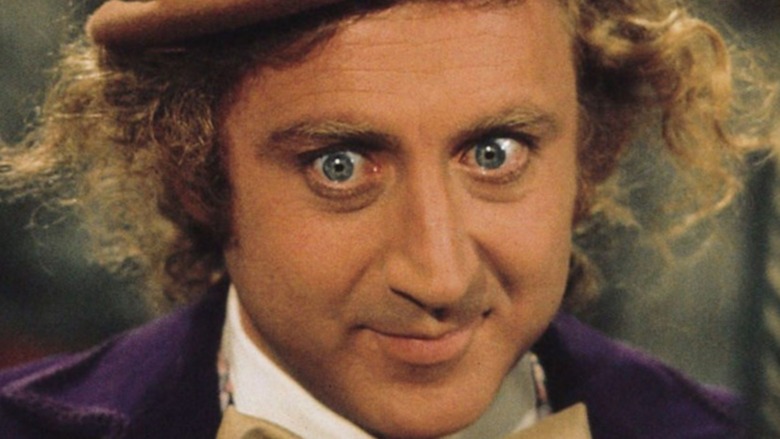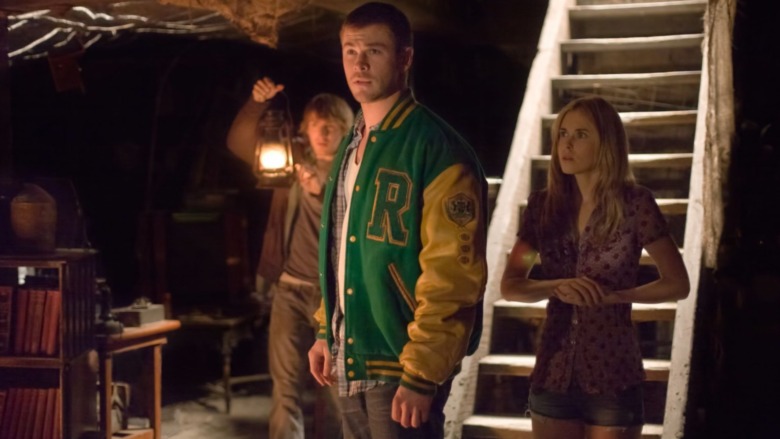The Ritual Theory That Changes Everything About Willy Wonka And The Chocolate Factory
In adapting author Roald Dahl's 1964 novel "Charlie and the Chocolate Factory" for the cinema, director Mel Stuart unwittingly created a pop culture mainstay. "Willy Wonka & the Chocolate Factory" hit the big screen in June of 1971, and though it wasn't a major monetary success — grossing roughly $4.5 million on a $3 million budget — moviegoers and critics adored it. Thanks to the talents of the late Gene Wilder as the titular candy maker, iconic songs such as "Pure Imagination," and its whimsical yet off-kilter aesthetic, its legacy only continues to grow nearly 50 years after its premiere.
Considering how long "Willy Wonka & the Chocolate Factory" has spent in the public eye, it should come as no surprise that individuals from all walks of life have analyzed it down to the last detail. This has become especially easy thanks to the rise of the internet over the past few decades and the popularization of chat areas like Reddit. They have given fans from across the globe a platform to discuss the movie from the comfort of their own homes, leading to the creation of very interesting theories.
For example, some have pointed out a dark parallel between "Willy Wonka" and a relatively recent horror project that has retroactively rewritten everything we thought we knew about the 1971 classic.
The eerie similarities between Willy Wonka and The Cabin in the Woods
Aside from the title character, the most important people in "Willy Wonka & the Chocolate Factory" are the children who get the chance to enter his famously secluded factory. They come from various backgrounds and boast different personalities, with their only real throughline being their discovery of the coveted golden tickets. Strangely enough, their contrasting attitudes, desires, and motives are incredibly similar to the group of five college students from the spooky 2012 flick, "The Cabin in the Woods."
The aforementioned film cites each of the young adults as belonging to one of the five archetypes found in the horror genre: the Whore, the Athlete, the Scholar, the Fool, and the Virgin. With these labels attached, they're used by the United States government for a secret ritual that subdues beings known as the Ancient Ones — a subterranean species that could wipe out the whole of humanity in one fell swoop. The victims can be killed off in any order, but it's imperative that the whore dies first and the virgin dies last or ultimately escapes with their life.
In connecting these concepts to "Willy Wonka," Augustus Gloop's (Michael Bollner) lust for sweets makes him the Whore, the competitive gum-chewer Violet Beauregard (Denise Nickerson) represents the Athlete, TV know-it-all Mike Teavee (Paris Themmen) is the Scholar, and Veruca Salt's (Julie Dawn Cole) life-endangering greed leaves her to be the Fool. That means that the kind and pure Charlie Bucket (Peter Ostrum) is the Virgin, which is even more fitting seeing as he's the only kid to make it to the end of the factory tour unscathed. All others find themselves removed for one reason or another, starting with Augustus' trip down the chocolate river (via Entertainment Weekly).
Though it's certainly a stretch to claim that Willy Wonka purposefully sacrificed a bunch of kids to prevent the destruction of all life on Earth, theories like this are certainly fun to ponder. If nothing else, it helps you look at a half-century-old movie from a new, much more disturbing lens.

